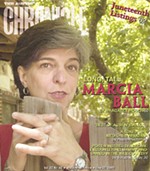When Too Much Information Is Inevitable
Managing Saturday's Managing the Media Blur panel
By Belinda Acosta, 8:14AM, Mon. Mar. 10, 2008
It’s de rigueur to bemoan the media – too much, too chaotic, too raunchy, too closed, too open, too, too, too whatever. Well, there is a lot to talk about, but if you take a walk through time with new media writer for Forbes Magazine Quentin Hardy, who spoke at Saturday’s panel Managing the Media Blur, there’s nothing and everything to complain about. In fact, “complain” isn’t the right word for it. Like puberty, middle age moments, and getting your heart broken (at least once), the current media revolution is not unlike those that came before it – inevitable, necessary, and endurable. Whenever a new medium exploded on the scene – books following the invention of paper, hand scripted books to books printed in signatures on a printing press, radio, TV, film, VCRs, DVDs, video games, the Internet – human beings, Hardy reminded the audience, wrestled with it, charged it with the extinction of intellect if not mankind itself, but ultimately, somewhat unceremoniously, accepted it as another thread in the fabric of communication life.
As for managing the media blur, CIO and VP of Engineering for Google, Douglas Merrill said we’re doing it already. He suggested that humans filter media using the “cocktail party” effect – you basically tune out what you don’t need or want, and tune into what engages you. The talk soon veered from managing media to a more philosophical discussion on media and information. What is media? Who or what has the authority to decide what is truth or factual? Merrill suggested that the future of factual journalism might be on the decline in favor of differences on perspective, slant, and interpretation. Instead of seeking the one, true authority on a matter, Merrill suggested going “for a chorus of demons that tell a multivalent truth.” In this way, no one entity owns truth, and the ability to access these various truths is just what the Internet provides, if humans are up to the task – and those that consider themselves the arbiters of truth and information are willing to share custodianship. And it doesn’t matter if the arbiters don’t want to share. The power of the Internet has already been released and there’s absolutely no way to put that genie back in the bottle.
A note to readers: Bold and uncensored, The Austin Chronicle has been Austin’s independent news source for over 40 years, expressing the community’s political and environmental concerns and supporting its active cultural scene. Now more than ever, we need your support to continue supplying Austin with independent, free press. If real news is important to you, please consider making a donation of $5, $10 or whatever you can afford, to help keep our journalism on stands.










